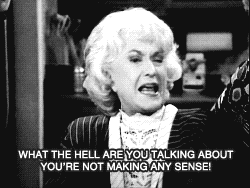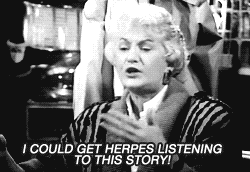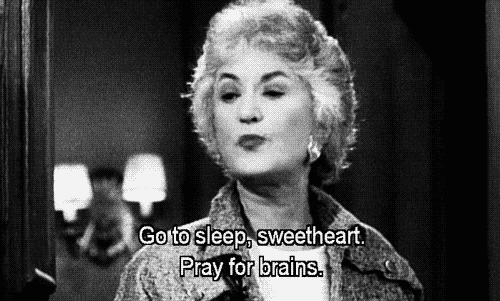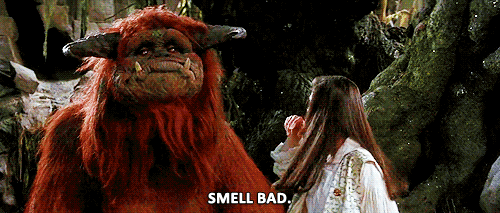This topic was first broached by Mary Ann—the notion of “the culture of scarcity” as it applies to the romance-writing community. A sense among writers, reviewers, even readers, that somehow the spoils of this market are limited and one person’s success snatches something from the others.
Serena grabbed the idea and ran with it, curating the following prompts and soliciting the group’s replies. She basically did all the planning and set the table for this dinner party, but since I’m the one laying out the actual food, it looks like I did ALL the work! ALL the credit to me! Culture of scarcity for the win!!
But let’s get into this. Onward to the first course!
Do you believe that success for romance writers is a limited resource? To what degree and in what ways?
Mary Ann: No. I think that when a romance writer achieves success that first, it is a success unique to that writer, and second, it is a success that is inherently unique that makes available some other kind of success that did not exist before for another writer. The more writers achieve success, then, the more kinds of writers can achieve more kinds of successes. Success is a completely unlimited resource and depends, in fact, on the success of other writers. As a writer it is important to me that other and more and more writers not only have success, but have increasing success, more kinds of success, and for it to continue happening.
What’s more, it is unlimited in that the more writers there are, the more kinds and types and numbers of readers will be engaged. In this way, success generates success and also, more resources for success.
Charlotte: Absolutely not. I think the very idea is absurd. If you write something that connects with readers it will be a success. I’ve seen so many people with no resources, no promo, no publisher backing, no nothing achieve success…so I can’t imagine how there would be any limit it on it. In the past I suppose publishers had slots and if you didn’t get one you had no chance of anything, but that’s not the case anymore. And even where it is… Again, if you write a book that connects with editors and agents and readers you will succeed.
Shelley Ann: I suppose that there are only so many books a publisher can publish per year, and there are only so many #1 spots on bestseller lists, so in that regard, success is limited. But I firmly believe that successful romance books—either commercially successful, successful in the literary sense, or some combination of the two—bring readers to the genre and retain readers of the genre, and that benefits us all.
What other aspects of our community do you believe are scarce or limited resources? (Approbation, attention, agents, editors, reviewers, readers, friendship, etc.)
Shelley Ann: As someone who works directly with readers every day at a library, readers are definitely NOT a limited resource. Library budgets for purchasing romance novels are, though, in a way individual readers’ budgets may not be, since librarians have a responsibility to a whole community to maintain a balanced collection. Attention, admiration, friendship—these are all resources I see as unlimited. If you’ve ever asked a booklover what their favorite book is, you’ll see that it’s entirely possible to love multiple books and authors enthusiastically. And while my time may be limited, my ability to love new friends and still love my old ones isn’t.
Charlotte: I think that agents are scarce in that they are obviously tough to get. Same with editors, maybe. But limited or scarce attention, approbation and readers seems like a weird concept to me. You might write a very niche book, which will obviously limit your audience…but this myth that that there are only so many readers and so only certain books can be successful…I don’t buy it. I see fervent, passionate readers everywhere, who WILL dig deep into their pockets if another book comes along that really speaks to them. People talk about gluts in the market to explain why books aren’t successful, but I think very few are willing to admit that maybe they weren’t successful because they weren’t as good or didn’t make the same connection with readers.
Mary Ann: I feel the community will organically grow to accommodate its own growth. Writers that write the work they believe in will find their own readers, growth of the genre will attract agents and industry professionals, and reviewers will rise from the increasingly diversified reading audiences.
Friendship is complex in its own way because it is a personal engagement that takes place inside of a larger system, then moves beyond it, and some people do well to identify a great number of friends, and others a very intimate circle, and there are as many different kinds of joys and loves from friendship as there are people. In the context of scarcity, I interpret this question to mean if an expansiveness of love and friendship is possible, if a person can love, and love well, more than one person, and how this love is perceived from the outside. I can only speak from my own experience and say that my love for one friend doesn’t diminish the love I have for another, and that life presents different needs at different times and different kinds of personal resources, which express themselves differently.
I think we can be confident of love, when it’s offered freely from those that we love, ourselves.
Do you believe that “a rising tide lifts all boats?”
Charlotte: As in Fifty Shades was good for erotica/erotic romance? Absolutely yes. I’m extremely grateful to books like that and like Beautiful Disaster for opening up avenues that didn’t exist before. Being bitter about those successes when they’re clearly lifting sales across the board is ridiculous.
Shelley Ann: In short? Yes, though I do think it’s good when we all push each other to do our very best work. Which, in at least this little corner of Romancelandia, seems to be true.
Mary Ann: Yes. And if there is a hole in your boat, please run a distress flag up your mast so someone can help you.
Ruthie: I do. Or I believe that it can. Because I think, looking around at most of the people I know in this romance writing and reading community, most of us began doing what we do because of love—love of genre, love of writing, love of reading, love of community. And when I think about rising tide and boats, I think about all the writers I’ve met who have helped me purely out of that love, that enthusiasm, and not due to any personal benefit they expected to receive. I can still remember getting a blurb from Sarah Mayberry for my first book and just—GOD—WOW—SARAH MAYBERRY! I’d put her name down because I love her books. She’d blurbed for me because she read and loved mine. Did her tide help lift my boat? Probably. Hers and a lot of other people’s. And I try to approach opportunities I have to read other authors’ books the same way. Not “Is it to my benefit to do this favor for this person,” but “How do I feel about this story? Do I love it? Can I spread the love around?” Because ultimately, the more talented people we have writing amazing stories about people and life, change and love, the better, right? How can that not be true?
Have you personally had moments when you were aware of scarcity or felt envy or other negative emotions about others’ successes that you think were related to conscious or subconscious notions of scarcity? How did you deal with them internally?
Cara: Naturally, everyone always wants to be the one tweeting their exciting news—their latest deal, their award nomination, whatever new threshold they’ve crossed. But I can admit, when even my brilliant, talented, deserving, most cherished friends announce they’ve just crossed a threshold I’d been hoping to soon reach, my stomach balls like a fist and I hate their guts for oh, say, fifteen seconds. The burning ugly. My rational brain knows they did not steal my deal, my sale, my chance at hitting a list, my praise and attention, my dream advance. They didn’t steal mine—they earned theirs. And when my turn comes, there will still be shiny Mylar balloons for me to wave around and point at and suck the helium from so I may shout my achievements with a shrill lack of dignity, possibly saddling others with the burning ugly for a few fleeting seconds.
The key thing is that if you’re a normal human being and experience that ugly, petty, 1000% natural impulse to punch your best friend in the face for his or her good fortune, you don’t do a thing with it aside from own it. Don’t snipe behind the spotlightee’s back, or tell yourself the pie’s too small and you’ll never get a piece big enough to bother with. Just feel the burning ugly for a minute, acknowledge it. Don’t shame yourself for feeling it, even though you think maybe it means you’re a terrible, selfish person. Just feel the burning ugly in your heart, but respond from the civilized, rational space in your head. Tell your friend you’re so excited for them, trusting that once the heart-clenching jealousy has passed, you will be. Genuinely.
Charlotte: I’m sure I’ve had envious feelings, just like anyone. But to do with scarcity? No. I don’t think my chance goes because someone else got something. Again…it’s absurd to think so, and important to at least try to reflect that maybe that person got it because they deserved it, and I didn’t. I’ve definitely had feelings of inadequacy, feelings of I wish I could write like someone else, and there are always the moments where you feel left behind when other people of similar status to yourself take off in some way. But I combat those feelings by doing my damnedest to be supportive. This isn’t some terrible corporate dystopia. We don’t have to step on each other’s face to succeed, or dwell on our lowest, bitterest feelings. I don’t want to do that. I want to raise other people up, not drag them down. I want to celebrate someone’s justified and deserved success. And though I may be sad that I cannot obtain what they have, I will not let that feeling conquer me.
Ruthie: Definitely. I think everyone who writes has these moments. I think people who read seriously and are tuned into the romance community often have them, too. Because, if you’re a writer, you just can’t stop yourself from comparing everything back to yourself. “She got a deal and I didn’t. Her first sale paid better than mine. She’s getting better reviews, more reviews, selling more books, hitting more lists.” We’re human. We compare. It’s hard-wired, I’m pretty sure.
I’m going to sound like a broken record, but I try to deal with them by being kind, both to myself and to the object of my envy. I tell myself it’s okay to feel this way, but not to let it become poisonous. If the person who I’m envying is a friend, I find ways to support that person that are authentic and as generous as I can manage.
Shelley Ann: I think my moments of envy have had much more to do with my own feelings of inadequacy than with the notion of scarcity. Sometimes I read other writers’ work and despair that they’ve already pulled out a story from my brain and done it better than I ever could, so now there’s no need for me to write it (I’m looking at you, Charlotte!). But it’s a kind of sweet despair, where I’m sad that I wasn’t the one who did it, but I’m glad the story exists in the world and grateful to find a kindred in whoever wrote it.
Mary Ann: When I feel envy or jealousy I think, “oh, I didn’t realize that was something I wanted, or thought that I may want,” and then I think about if there is a way, within the path I am on, to either get something like that thing, or to think about what it is would fill the same “spot” that would give me satisfaction or a feeling of achievement. Jealousy and envy can be powerful identifiers of the things that we want or need for ourselves that we haven’t found the right journey towards.
Also, it’s usually a good idea for me to look around and see what’s going on in the broader context of my own life. I probably need something, and it may not even be the thing I’m envying, is the thing. Sometimes it is a simple thing, sometimes it’s a more complex need I haven’t articulated well. Maybe it’s as simple as what I need is to make a stronger connection with the person I am feeling jealous or envious of, because that’s the lack.
I am not inclined to feel scarcity–it is more likely that I’ll feel overwhelmed that there are so many different ways I could meet my needs for my career, and I don’t understand the right way for me, yet. It’s less of a feeling of despair that I am standing in line as the last things are removed from the shelves, right in front of me, that there isn’t enough, and more that the shelves are so full of so many different kinds of things, that I will pick wrong or never be able to choose.
Which is why it’s good to get help. To ask for lots and lots of help. To stop and ask, and ask some more. And receive that help in the same spirit you’d give it, which I truly believe that most people are so thrilled to extend help, and so happy to have the opportunity to guide others and boost them.
When I am overwhelmed in just this way I described, it goes away when I ask for help, even if I haven’t even received helped yet, and only asked.
There is such a psychic unknotting that comes with, “please help me.”
Have you witnessed behavior by others that you think reflects scarcity thinking on their part?
Charlotte: Yes. I’ll just leave it at that.
Shelley Ann: Yes. For whatever reason, I think women and girls especially are taught that love, adoration, accolades, whatever, are a zero-sum game. You’re either the best, or you’re nothing. You’re the prettiest, or you’re worthless. You’re the valedictorian, or you’re a loser. Which, frankly, is ridiculous. For one thing, there is no such thing, when it comes to books, as “best.” There are good sales and accolades and all of that, but honestly, the important thing is for a book to find its reader and connect with him or her. I think I’ve developed that perspective over years of being a librarian where my job is to find the right book for the right reader, realizing all the while that what changes one person’s life might be a wallbanger for another. But I’ve been lucky to have had this experience, because I see other writers who don’t share this perspective (and once I’m no longer in the “aspiring” camp, I may have a hard time holding on to this belief.)
Mary Ann: Yes, but more I often I observe great vulnerability and bravery–people writing and writing and writing, people finding new ways and trying new things, people talking to each other and asking questions, people pioneering new kinds of writing and reading technology and reader identification and industry tools, new and organic growth of debut blogs and interesting discussion. More often, that’s what I see, overwhelmingly more often.
There’s as many ways at this as there are people, is the thing.
And so, the most concrete example of scarcity thinking I observe in this community is didacticism: “You must,” “You should,” “Don’t ever,” “Do this,” “Don’t do this,” “Here are the rules.”
Because, if there is only a handful of perceived ways to “get” something, it’s that too many people are heading towards limited resources and must self-cull or be culled, so here are the didactics to check yourself. Didactics embody scarcity thinking. Didactics create false gates and gatekeepers, hierarchies, elitism, and kill creativity and divergent thinking. Didactics are not innovative, they cannot make anything, they are they opposite of making anything.
A constraint is one thing. A constraint is a tool to think of more and more and more in a singular available space. A constraint is a way to imagine the opera in the phone booth and to make it an opera without boundary.
A didactic tells you that operas belong in opera houses and phone calls belong in phone booths.
What factors intensify people’s perceptions of scarcity?
Mary Ann: Sexism, racism, ageism, classism, ableism, centrist norms, homophobia, poverty, lack of access, illness, conventional tropes for beauty or gender normative behavior, lived experiences, communication from central locations of power that resources are scarce.
Shelley Ann: I think a lot of it has to do with how competitive you are as a person, how much you’ve bought into a narrative that your success is something you measure against others rather than something you evaluate and re-evaluate based on your own values and happiness. But that’s really, really hard to do, especially when we’re all awash in this idea that to succeed means to do better than others.
Charlotte: It’s just the competitive, pressurised nature of the business. I hope it doesn’t sound like I think badly of anyone who succumbs to this mindset. It can be lethal, and very persuasive—especially when it seems so direct. You query an agent, the next day someone signs with them and you are rejected. It’s easy then to think, Fook, I missed my chance that person stole it from me! But even then, you’ve gotta fight it. Recognise it for what it is: nonsense. Maybe that person had been waiting for years. Maybe they’ve been working for years in ways you haven’t. Maybe their book was the exact right fit and yours could never be.
BUT. Maybe your next book will be the one that does fit. That is the way to think. There’s not a finite number of chances for each person. The only people who truly fail in this business are the ones that give up.
Do you think a culture or concept of scarcity in our community reflects a larger concept of scarcity in our culture as a whole?
Cara: To me, the scarcity mentality transcends any one realm of life. I think it’s practically instinctual to our species, to survey others’ wealth and good fortune, and no matter how much you love them and genuinely wish them the best, in the most balanced and rational rooms of your head… There’s going to be that toxic, fearful murmur from the crawl space. “She what?! No!! This is awful! There’ll be nothing left over for us!!”
Mary Ann: Yes. This is why things like making arts available in the schools is important–art and music and extracurriculars. The more opportunities we have as humans to be creative, and the more often we are, and the earlier we are exposed to these opportunities to be creative, the more creatively we think about everything. We think in terms of how to make things, instead of how to get things, and how if we don’t get things before everyone else nothing will be left. It’s impossible to engage with the roots of scarcity, to engage, then, with sexism, if you’re used to thinking creatively, because if you are thinking creatively, you’re thinking about ALL the tools you need to make the world, not just a few.
Creativity deficit means we think in terms of what it is there is left, instead of what it is that hasn’t happened yet, what we haven’t made happen.
Shelley Ann: Absolutely, especially as it applies to girls, and especially as it applies to girls and what they are taught about their loveability. I think girls are told that they only deserve love if they are the very best—at being pretty, or at being smart, or whatever— and are taught to see other girls as their rivals in this endeavor. And then I think many women spend a long time overcoming that conditioning. Not to sound trite, but it’s all about the patriarchy.
How might we as a community change behaviors that reflect beliefs in scarcity to be a better community?
Shelley Ann: I think we have to recognize when we’re doing it and make a conscious decision to step away from that kind of thinking. I want all romance writers to write their best work. I want all of those writers doing their best work to do well, whatever that means for them. And, you know—I recognize that I am writing this from a perspective that has the privilege of not yet having had to face bad reviews or horrible sales or any of the challenges that would make it really fucking hard to do what I’m saying.
Charlotte: Fight it. Fight it every day, if not for other people then for your own mental health. Remind yourself that it’s nonsense. Remind other people. Support other people. Ask yourself and others: do you want to be that terrible corporate dystopian future?
Mary Ann: I think working on the things we need to work on as humans is always a good idea. Asking for help. Asking questions. Extending help freely. Spending our time making what it is we want to make.


























